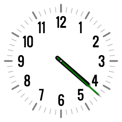Let’s learn how to tell time in Portuguese! That way you’ll know whether you are cedoearly , a horason time , or atrasadolate . 🙂
If you don’t have a phone or watch with you, you could ask someone Que horas são?What time is it? , i.e. “What hours are there?”
A more formal/polite option is: Tem horas que me diga?Do you have the time?, Could you tell me the time? , i.e. “Do you have hours that you tell me?”
The 24-hour Clock
While many countries favour the 12-hour clock system, Portugal usually uses the 24-hour clock, especially in more formal contexts.
How to Tell Time in Portuguese: The Basics
Formal
In formal situations, you should apply the 24-hour clock system, and use the exact minutes shown on the clock. (We’ll discuss more informal options to talk about subdivisions of time down below.)
 São dezasseis horas e vinte e dois minutosIt's 16:22 (4:22pm)
São dezasseis horas e vinte e dois minutosIt's 16:22 (4:22pm)
Note: In most situations, it’s optional to include the words horashours and minutosminutes , so this example would often be shortened to just “São dezasseis e vinte e dois“.
Informal
You may notice that Portuguese often apply a 12-hour system in informal contexts. Instead of saying a.m. and p.m. (which aren’t used in Portuguese-speaking countries), they’ll specify whether it’s morning, afternoon, or evening/night.
São 7h30 da manhãIt's 7:30 a.m.
São 2 da tardeIt's 2 in the afternoon.
São 10 da noite.It's 10 in the evening.
É or São?
Did you notice that we’ve been using the plural form of the verb – são – in these examples? In English, we treat all times as singular, but in Portuguese, you should think of it in terms of horas (hours).
This means you use são for all times except 1 o’clock (uma hora).
- É uma da tardeIt's 1 in the afternoon – i.e. “It is one (hour) of the afternoon.”
- São duas da tardeIt's 2 in the afternoon. – i.e. “There are two (hours) of the afternoon.”
As mentioned, it’s common to drop the words hora and horas here, because they are implied.
Of course you will also use é for anything else that is singular, such as É meio-diaIt's noon and É um quarto para as 8h da noiteIt's a quarter to 8:00 p.m. .
Subdivisions of the Hour
Now that we know which numbers to use, let’s get into the specifics of how to tell time in Portuguese. When you want to clarify that the time is exactly at the top of the hour, you use the expression em pontoon the dot, sharp
There are also different expressions for referring to the other minutes of the hour:
- eand – Separates the hours and minutes
- para ato, until – If you’re referring to 1 in the morning or afternoon, it’s singular
- para asto, until – If you’re referring to any other hour, it’s plural
- meiahalf – i.e. 30 minutes past the hour
- um quartoa quarter – i.e. 15 minutes past/until the hour
Portuguese Time Format
The written format 0h00 (e.g. 23h30, 7h15, etc.) is more common in Portugal. If it’s right on the hour, you will often see just 3h, for example. As you may have guessed, the h stands for horas. Using colons (e.g. 23:30, 7:15, etc.) is also acceptable.
Members: In the following lessons, we’ll use this 0h00 format as a default for consistency. However, if you would rather practice spelling numbers or thinking of it word by word, you also have the option to write it out (e.g. vinte e três horas e meia instead of 23h30). If you get one incorrect, check down below the answer to see the correct spelling.






A very clear explanation with everything in one place. Just what I needed thank you.
It makes me realize how complicated telling the time is in my own language . Thank goodness we learn it when we are children .
Thank you for making learning Portuguese fun and interesting .
Telling time in any language can be challenging. Thank you for explaining it this way! I Need a lot of practice to master this.
dez faltam para sete – e correcto ? its ten to seven
Olá! Nós dizemos “Faltam dez para as sete” ou “São sete menos dez”.
When do you use “para as” versus “menos” in telling time, or are they interchangeable? Obrigada!
They’re interchangeable, but there’s a regional difference here: Northern Portugal prefers “menos”, while “para as” is the most common choice down south 🙂
I can understand why you have 12am as midnight as it is a common error in english but it is wrong. If 11.59 is am then so is 12.00 (noon) It becomes pm at 12.01. Because so many people, including businesses get it wrong, organisations such as the police and armed forces avoid using 12.00 but use 11.59, 12.01 or 23.59, 00.01. .It is much clearer in Portuguese.
Thanks for your message! I agree, it’s so much clearer in Portuguese (and with using the 24-hour clock in general)! 🙃
Most official sources I can find (National Physical Laboratory, American Heritage Dictionary of the English Language, Canadian Press Stylebook) say either that there’s not an accepted standard or state that the “convention” is to use a.m. for midnight and p.m. for noon, and then elaborate to say that it’s best to add the words midnight or noon, or to avoid using a.m. and p.m. altogether (like what you mentioned — using 11:59p.m., 12:01, etc, instead).
It’s funny — if you think about what a.m. and p.m. actually mean, then both would fit since 00:00 is simultaneously 12 hours post meridiem and 12 hours ante meridiem. Since it’s a bit ambiguous, we think it’s best to stick with the most common convention and what most clocks/devices/businesses use: 12:00a.m. as midnight (the start of the day) and 12:00p.m. as noon (the middle of the day). Then we added “midnight” and “noon” to clarify.
thank you for your reply. I think this is an example of bad practice taking over. The Greenwich website admits as much but does point out that it is inaccurate. It defies logic that 11.59 is am but 12 is not, as pm means post meridian, ie after noon and 12.00 is noon. I guess I must bow to the majority but it pains me. Thanks for your trouble.
Can someone please explain why ‘onze horas’ and ‘doze horas’ the ‘e’ is pronounced?
Muito obrigado
Nice job noticing that! When an e is followed a medium or open vowel sound (e, a, or o), it sounds more closed. (like “ee”).
If you’re ready to take a deep dive, you can read more about some of these pronunciation variations here: Variations in the Pronunciation of Ending Sounds
and here Pronunciation Guide for European Portuguese Vowels
Hi Molly,
Thanks for your quick reply. I had a look at both links and it feels a bit more advanced than my level for now, but I’ll get back to it! Thanks
I am curious about the use of De (De manha , eu levanto – me as 11h00 ) vs DA manha (nao ha voos as 4h00 DA manha. Have I missed this somewhere?
Olá! Thanks for your good question. Let me refer you to this forum post, where the distinction is explained in detail: Practice Portuguese Forum | “De manhã? Na manhã? Pela manhã?”
Olá 🙂
Something that could be interesting to add : in the north of Portugal 12h30 (30 minutes past noon) will be : “é meia-hora”
Cumprimentos
Thank you for this comprehensive explanation. I have struggling for ages to understand this and how its clear wow awesome
1530 hours is the military time equivalent of 3:30 pm. There is no need to write AM or PM because military time is based on a 24-hour clock. To assist you convert from civilian to military time, you may find a military time to regular time converter online or as a mobile app.
Thank you for your detailed explanation. I’ve been fighting for months to comprehend this and how obvious it is amazing fantastic
Why is it vinte e dois minutos but vinte e duas horas?
Minutos is masculine, so you have to use the masculine form of 2, which is dois. Horas is feminine, so you use the feminine form, which is duas.
I just wish there was a squeeze to practice telling time. That’s usually time-consuming with this 24 hrs standart
Very helpful
What is the correct translation for the phrase “I think it takes 20 minutes” Is it “Acho que leva 20 minutos ” or “Penso que demora 20 minutos”?
How to know when to use leva vs demora?
Muito obrigada
Olá! Both translations are perfectly fine. “Acho que leva” sounds more informal, but otherwise, it’s a matter of personal preference. In reference to the time that something takes, the verbs ‘leva’ and ‘demora’ can both be used freely (again, with ‘leva’ sounding more informal than ‘demora’). Just note that ‘demora’ can be used on its own, while ‘leva’ can’t. For example:
– Estás a demorar! (You’re taking long)
– Estás a levar muito tempo! (You’re taking a long time) -> you can’t just say “Estás a levar”
Excellent explanation! Thank you!